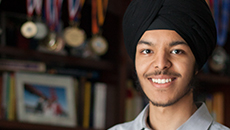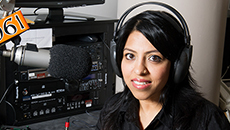Our parents are our heroes – well, at least for the first decade of our lives. As one enters the teenage years, it hits hard to realize that parents aren’t actually always right. However, with such a mindset, parent-youth relationships are bound to stagger because two flawed assumptions are being made: (1) I am right. (2) You are wrong. ‘Right’ and ‘wrong’ are very conclusive in nature, with minimal room for discussion. However, replacing these words with ‘different’ raises the right question – why? This ‘why’ is not an immediate one, but rather one of ideologies. Why do my parents think the way they do?
The answer lies not in a one-time conversation, but in a process called communication. In fact, it is precisely the lack of communication that hinders the possibility of ever being able to answer the ‘why’ and covers our vision with a veil of assumptions. Simply put, to strengthen your relationship with your parents, you have to talk. Disclaimer: this is not a talk or worse – the talk. Communication is an ongoing process that needs to be embedded in the lifestyle of your relationship with your parents.
“Hold on! Talk? That too with my parents? But we have nothing to talk about!” – Fair enough. It is understandably awkward to sit your parents down and brainstorm a list of mutually-appropriate, conversationally-blooming topics. Thankfully, communication has less to do with words and more to do with time. Over half the effort lies in spending time with your parents. Moreover, this time needs no scheduling; the trick is to make an effort to use time that already exists throughout the daily routine. Make it a habit to avoid spending the car ride in utter silence on your phone. Choose to eat together rather than at separate times. Spend 15 minutes with your parents from the hour you set aside before bedtime to scroll through your social media feed.
The actual talking doesn’t call for an especially important topic. Start the conversation with trivial talk, with something as simple as what’s for dinner. The beauty of communication is that the more you do it, the easier and better it gets. The hardest part is starting it. But get this – you’re not talking to a stranger. These are, after all, your parents! There are three broad categories to take your pick from if you’re at a loss for words – the past, present and future. Bring up past memories and reflect on them for a good laugh. Talk about the projects you’re talking up in school at the moment or that one class you cannot help but snooze off in. Discuss your future plans and insecurities about what tomorrow holds.
Remember that communication is a two-way street. Along with expressing yourself honestly and clearly, analyze how your parents interact. Listen, not with the intent to reply, but to absorb. This will help you begin answering the ‘why’ and understanding your parents’ point of view. You will be amazed at the similarities you find and the connections you make. You may want the latest smartphone and think your parents cannot relate to you. However, a conversation may reveal that your parents, years ago, wanted the latest cassette player. Times change, but the underlying essence is the same.
Communication with your parents will allow you to uncover this essence and help you discover the ‘why’ for your parents and vice versa. Undoubtedly, communication can go a long way to improve the relationship you share with them. Words are the foundation of effective communication, which further leads to building the base of any relationship.
About the author:
Naina Grewal is a youth radio show host on Red FM and is pursuing a Business and Communication Joint Major at SFU as a student on the President’s and Dean’s Honour Roll. Recently recognized as Surrey Board of Trade’s Top 25 Under 25, Naina is an engaged community volunteer, passionate about creating dialogue, and stirring youth involvement.





